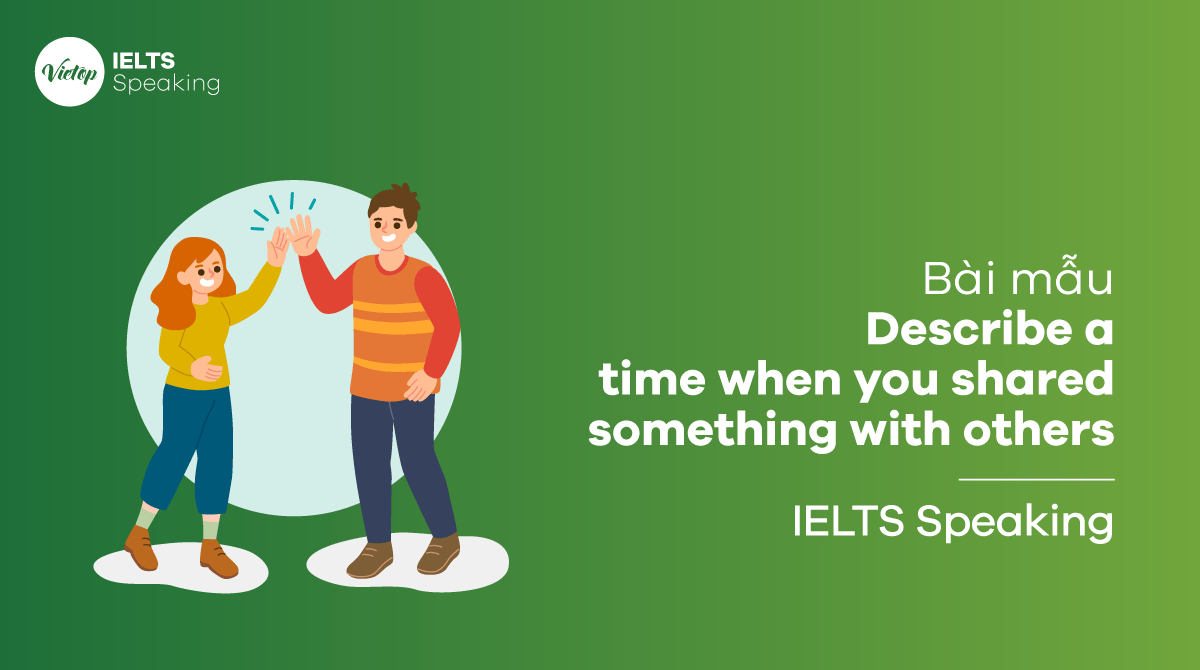Topic Sharing là chủ đề đã xuất hiện một vài lần trong phần thi IELTS Speaking part 1, IELTS Speaking part 2 và IELTS Speaking part 3. Một số câu hỏi về Sharing sẽ xoay quanh bản thân mình có thích chia sẻ không; Gia đình có hướng dẫn mình cách chia sẻ với người khác không; Mình thích chia sẻ về điều gì; Có những điều gì không thích hợp để chia sẻ…
Cùng Vietop nạp thêm cho mình một số từ vựng và mẫu trả lời mẫu cho chủ đề Sharing này nhé!
1. Từ vựng topic Sharing
- Give somebody a hand: giúp ai đó
- Blessings: phước lành, sự hạnh phúc
- Personal possessions: đồ dùng cá nhân
- Play a vital role: đóng một vị trí quan trọng
- Flows back: quay trở lại
- Feel secure: cảm thấy an toàn
- Compromise: sự hòa giải
- Fairness: sự công bằng
Xem thêm: Khóa học IELTS Online – Luyện thi trực tuyến cùng chuyên gia IELTS 8.5
2. Một số câu hỏi thuộc topic Sharing – IELTS Speaking part 1

Mời bạn cùng nghe Podcast bài mẫu Part 1 của Vietop English nhé:
2.1. Do you like sharing things with other people?
Well, it depends. If we talk about sharing food or give others a hand when they need it, I would be definitely ready to share. In addition, one of the best things I love to share with others is my happiness and blessings. However, if we talk about my personal possessions such as my mobile phone or laptop, I would like to keep them private.
2.2. What things do you like to share with others?
Well, when it comes to sharing things, I can share my stuff with family members such as food, clothes, books. Moreover, I believe sharing knowledge and experience plays a vital role as well because by learning and enriching knowledge, listeners can change their lives. Besides, when we share our feelings, knowledge and possessions with others, we create a relationship of trust, which in most cases flows back and helps us feel secure and happy.
Bạn có thích chia sẻ những điều thú vị với người khác không? Trong bài thi IELTS Speaking, khả năng chia sẻ ý tưởng, kinh nghiệm một cách mạch lạc và tự tin là rất quan trọng. Khóa học IELTS 7.0 của Vietop English sẽ giúp bạn nâng cao kỹ năng chia sẻ bằng tiếng Anh, từ đó chinh phục mục tiêu IELTS của mình.
2.3. Did your parents teach you about sharing?
Of course. My parents used to teach me about sharing and caring. I think sharing teaches children about compromise and fairness. In addition, I guess sharing has become one of human nature which helps us survive and develop.
2.4. Do you think kids like to share?
Yes, I believe that most children have a natural inclination to share. Sharing is often a part of early social development and is encouraged by parents and caregivers. Children can derive joy from sharing their toys, treats, or experiences with others, and it’s a way for them to connect and build relationships. Of course, there can be variations in how much individual children are willing to share, but overall, it’s a common trait among kids.
2.5. Would you like to share your feelings the group?
Yes, I’m comfortable with sharing my feelings with a group, especially when it’s a supportive and understanding environment. Sharing one’s feelings can often lead to better communication, empathy, and problem-solving within a group. However, it does depend on the context and the nature of the group. I believe in open and honest communication, and I’m willing to share my feelings if it contributes positively to the group’s dynamics and goals.
2.6. What do you like to share?
That’s an intriguing question. I consider myself to be a generous person, and I’m generally happy to share most of my belongings. However, one thing I particularly enjoy sharing is food. I firmly believe that sharing a meal is one of the most fundamental ways to bring joy to people. It’s a mutually beneficial experience for both the giver and the recipient.
2.7. Why do some people not want to share with others?
I think that certain individuals tend to be self-centered, perhaps due to their upbringing. It’s possible that they weren’t instilled with the value of sharing during their childhood. Consequently, as they mature, they may exhibit a more self-focused attitude and be less inclined to share their belongings or extend assistance to others.
2.8. What would you think will be commonly shared in the future?
I can’t say for certain, but I have a hunch that in the next 5 or 10 years, one of the most widely shared things will continue to be information. In this age of rapidly advancing technology, everything and everyone seems to revolve around the digital world. However, I should clarify that this is just a personal opinion, and I’m by no means an expert on the matter.
IELTS 4.0 – Mở ra cơ hội du học. Khám phá lộ trình học chi tiết trong khóa luyện thi IELTS 4.0
3. IELTS Speaking part 2 – Describe a time when you shared something with others
You should say
- What you shared
- Who you shared with
- Why you shared it
And explain how you felt about sharing it.

Mời bạn cùng nghe Podcast bài mẫu Part 2 của Vietop English nhé:
Ahh this cue card reminds me of the time when I was only 15 years old, when I thought I finally had my personal bedroom and I was so happy about it. I always used to keep it spick and span because I really wanted a space of my own. But after a few months, since my parents decided to redecorate the house, I had to share it with my little sister.
I was quite disappointed to hear as I didn’t want to compromise my privacy and my sister back then was pretty messy. I tried to talk to my parents about how she would make the whole room disorganized, but they said I had no other choice but to make an exemplary model for my sister. It took me a few days to adjust with my sister’s presence in the room but soon we got on good terms.
We often spent the whole evening watching TV, listening to music, playing board games and studying till late. I must say by sharing a room we realized we have so much in common, something that I had not known before. Being a good sister, I showed to tidy things up and luckily, she was very nice and followed everything I said. We did encounter some minor conflicts regarding cleanliness every now and then. However, with my influence, she too became a tidy person. My parents were also very pleased that we got along well.
Now we don’t live under the same roof anymore since I work in a different city. I have to admit that I really miss her sometimes, and of course, our memories together. All in all, I am grateful to my parents who showed me the significance of sharing and now I don’t hesitate to share things with others.
- Spick and span (phrase): ngăn nắp, sạch sẽ
- Disorganized (adj): lộn xộn
- Exemplary model (n): tấm gương (cho người khác noi theo)
- Get on good terms (v): hoà hợp
- Tidy things up: dọn dẹp
- Conflict (n): mâu thuẫn
- Get along well: hoà hợp về tính cách
- Live under the same roof: sống chung 1 nhà
- Hesitate (v): ngập ngừng, lưỡng lự
4. IELTS Speaking part 3: Topic Sharing things

Mời bạn cùng nghe Podcast bài mẫu Part 3 của Vietop English nhé:
4.1. Do you like to share?
Well, sharing is definitely a good habit to have. I don’t mind sharing my clothing items with my sister and my friends. Because we do share the same taste in fashion, they sometimes lend me their items as well. So you know, it’s basically reciprocal.
- Reciprocal (adj): có qua có lại
4.2. What are the consequences if children don’t like to share?
I think it might be difficult for children to strike up relationships with others if they are hesitant to share. When children grow up, they might face even bigger problems at school or at work. They will find it challenging to make friends, and this would put them in a disadvantageous position in their later life.
- Strike up a relationship: bắt đầu mối quan hệ mới
4.3. How could parents and teachers teach young children to share?
As children grow, they will develop a stronger sense of fairness and might not want to share a toy if they think they won’t get a fair go. Therefore it might help to reassure your child and others that they’ll all get a turn in the game.
Additionally, it is a well-known fact that children always copy their adults or follow the elder’s footsteps. So if their parents and teachers are excellent exemplary models of compassion, then children are likely to share their things without extra lessons.
- Get a fair go: giành phần công bằng với nhau
- Compassion (n): lòng trắc ẩn
4.4. Do people in your country (or, you) prefer to share public transport or do they (you) prefer to use private transport?
It depends on a number of factors, including the location, time, and financial situation. People can save money by using public transportation if they have the time. However, some people are extremely introverted and prefer to go alone and by private vehicle.
- Introverted (adj): hướng nội
Hy vọng với những chia sẻ trên về Topic Sharing sẽ giúp ích được cho bạn trong quá trình luyện thi IELTS nói chung và phần thi IELTS Speaking nói riêng nhé!









